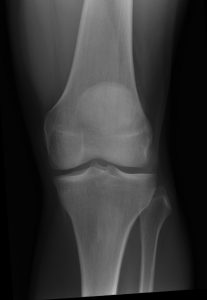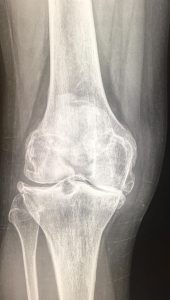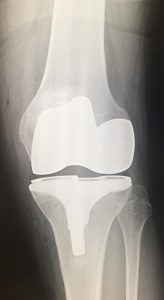Joint Replacements and Osteoarthritis
An interview with one of our fabulous students.
Becki Moore: Thank you so much for your time today. If you don’t mind me asking, how old are you?
Student: 52.
Becki Moore: and you have just had a knee replacement?
Student: That’s right.
Becki Moore: Can you tell me how you felt about having your knee replacement before you had it done?
Student: I really didn’t want to have it done. I put it off for years, it only has a lifespan of approximately 10 to 15, possibly up to 25 years and so I wanted to leave it as long as possible as generally, the second replacement will not be as successful.
By learning to understand and take control of my body (part of which was through attending Pilates 2-3 times and week with you) I was able to put off my op for 3 years. I was very apprehensive, but I had it done as a last resort because my life was changing.
Becki Moore: How was your life changing?
Compromised life
Student: My life was becoming hugely compromised. I was a freelance hairdresser and now I have to work from home and sit on a stool. I wouldn’t be working now If I didn’t have my home salon. I do not go shopping anymore or walk the dogs, because it’s too painful.
Becki Moore: What is the pain level like? I understand that you really need to have a replacement is when it gets to the point that it is hurting all the time, even at when inactive and at night?
Student: Very rarely am I not in pain. Most of the time I’m in a muscular pain like a dull ache and then suddenly from nowhere something will click and shoot pain. When I get tired, I have a burning pain inside, even when I’m just sitting doing nothing it feels like there’s a fire burning. When im walking, every step is painful because it’s bone on bone. My knees have been hurting probably the last 15 years. At the very beginning they started clicking and I had intermittent pain and they have gradually got worse.
Becki Moore: So, you made the decision to have a replacement and you’re now waiting to have your second one done. How do you feel now you have had the first done, what difference has it made to your life and to how you’re feeling?
Recovery
Student: I went on a short dog walk yesterday and my unoperated knee was really painful, but my operated leg wasn’t hurting at all. I’m eight weeks post op at the moment, so noticing that was fabulous.
At the moment, I feel I’m out of balance. I can get my operated leg straight but my unoperated leg, I can’t. I feel that my pelvis is out of line. I know I need to have my other leg done because they were both as bad as each other and I need to put myself back in balance.
I am apprehensive because I know it’s a huge operation and the recovery is really painful, but if it goes as well as my last leg, I am really excited because I will get my life back.
Becki Moore: So overall, you are excited about what it’s going to do for your life.
Recovery process
Becki Moore: I have been absolutely amazed at how quickly you’ve recovered and the strength that you’re getting back is incredible.
I know that you did a lot of research yourself and that you took responsibility for what was going on and made sure that you put yourself in the best position to firstly; avoid the surgery for as long as possible, but then to also to make sure that you were strong enough to recover as quickly as possible when it came to having your opp.
So, what was it that you did pre-op to maintain your strength and mobility?
Student: Well, before I met you, I used to do Pilates, Yoga, and Aerobics, and initially, when my knees started getting bad, I stopped doing all of that because I didn’t have enough information to know what would aggravate them (making things worse) and what I should do to keep my joints mobile and the supporting muscles strong.
I started researching it started talking to people. Then a friend went to your Pilates and said, ‘You’ve really got to try it, Becki is great’.
When I came to you, I could talk to you and explain to you exactly what was going on in my body and you gave me alternatives for the things that were not good for my body. Then I could do Pilates and strengthen other areas of my body, without compromising my knees. This was really important for me.
It wasn’t just my knees that had been affected I also used to have a really bad pelvis and back. When I laid on my back for any length of time I couldn’t get up, my pelvis would get really stuck and be really painful. Now my pelvis and my back are so much better, which is only going to get better as my knees get better
You need to need to understand Pilates, you need to understand why you’re doing it, and you need to get a feel for it in your body. That’s why I like your classes as you explain good technique in detail.
Now I am more experienced, my mind is watching my body, what’s going on and how my body’s reacting to it. So, I know when something doesn’t feel right and I stop. Whereas in the beginning, I would work through an uncomfortable feeling or something that wasn’t right for my body, because I just I didn’t know that it wasn’t right. I didn’t know if it was because I was unfit or what the situation was.
Becki Moore: Yes, I always say if it doesn’t feel right in your body, let me know. It’s about understanding your body and correct alighnment. It may well be I will give you a tiny adjustment and it will feel right if you’re a little out of line, or it may well be that exercise is not for you if its injury/condition related and then I can give you an alternative. That’s the great thing about Pilates, everyone can do it!
Student: Yes and It’s not just about going to Pilates for recovery, it is really important pre-op as well. It is great that you gave alternative exercises to suit everyone in class.
Becki Moore: I was also lucky enough to be able to give you some information from my training in regards to exercises that you could do from home during your recovery to compliment the exercises you were given from the hospital post op as well. Were they helpful at all?
Student: They were really helpful. They really helped to strengthen. They were great for once I had moved on from what the hospital had given me.
I think also having a pillar of knowledge behind me to know when to stop was also important. If I hadn’t been doing Pilates pre-op, I wouldn’t know how to recognize when to stop and when I needed to push more. So, a big part of it is the knowledge that I’ve had gained from the couple of years that I’ve been seeing you.
My recovery now is about building it into my life, to help maintain my posture, strength and flexibility.
Now I am concentrating on getting the full movement back in my operated leg and keeping the strength in my unoperated leg for the operation that is coming up in five weeks. I need to get this operated leg as strong, and mobile as possible because the scar tissue is now forming and all my tendons and muscles are quite stiff, so I’m working on that really hard.
Becki Moore: Do you massage the scar?
Student: Yes, and I have to move the kneecap from side to side. I’ve got a patella button, it’s been resurfaced under the kneecap and that has to be manipulated gently, every day to stop scar tissue forming. My joints and muscles need daily activity to feel good. I stretch my calves and backs of my legs a few times each day so I do not allow stiffness to build up.
Osteoarthritis
Becki Moore: So, it was osteoarthritis that you had. You had guidance from me in regards to what exercises to do and not to do, and I understand you have made other changes in your life in regards to nutrition?
Student: Yes, I now hardly eat wheat because that’s inflammatory. I don’t eat dairy products anymore either. I take supplements; krill oil, pantothenic acid and turmeric all of those are quite high doses.
I am trying to cut down on sugar. It is a huge difficulty for me but it is probably one of the worst things, if I eat too much sugar, I really notice it.
Thank you and Welcome Back
Becki Moore: So, you have now been back in class for 2 weeks, attending 3-4 times a week. It has been great to have you back only 6 weeks post op!
Student: Yes, the thing I love about coming to class is that I’m being corrected because I can’t see what my body is doing at home. It’s so good to be moving my body again in the right way and your classes are a lot of fun, its great to be back! I can’t believe people don’t do Pilates more, because, why well wouldn’t you?
Becki Moore: Well obviously I agree 😉 .
Thank you so much for your time today. I am sure this has been very helpful to those with current knee replacements, those considering, and those with Arthritis.
Contact Me
If anyone would like any more information on how Pilates can support Arthritis and Joint Replacements please feel free to contact me via message or on 07583347978 and I am more than happy to discuss.

 BeMoore Pilates, Yoga & Personal Training
BeMoore Pilates, Yoga & Personal Training 




Leave a Reply
Want to join the discussion?Feel free to contribute!